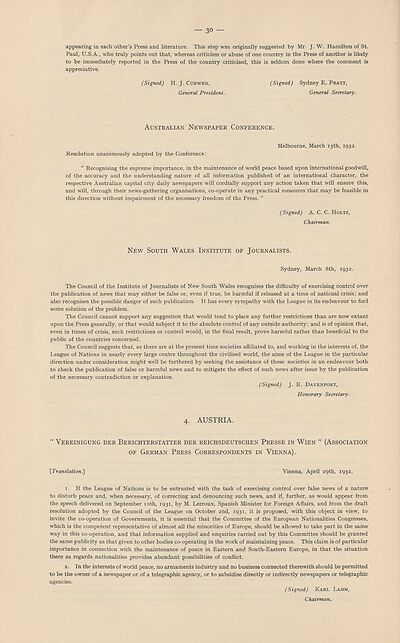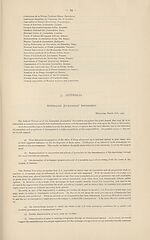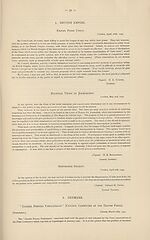Download files
Complete book:
Individual page:
Thumbnail gallery: Grid view | List view

appearing in each other’s Press and literature. This step was originally suggested by Mr. J. W. Hamilton of St.
Paul, U.S.A., who truly points out that, whereas criticism or abuse of one country in the Press of another is likely
to be immediately reported in the Press of the country criticised, this is seldom done where the comment is
appreciative.
(Signed) H. J. Curwen,
General President.
(Signed) Sydney E. Pratt,
General Secretary.
Australian Newspaper Conference.
Melbourne, March 15th, 1932.
Resolution unanimously adopted by the Conference:
" Recognising the supreme importance, in the maintenance of world peace based upon international goodwill,
of the accuracy and the understanding nature of all information published of an international character, the
respective Australian capital city daily newspapers will cordially support any action taken that will ensure this,
and will, through their news-gathering organisations, co-operate in any practical measures that may be feasible in
this direction without impairment of the necessary freedom of the Press. ”
(Signed) A. C. C. Holtz,
Chairman.
New South Wales Institute of Journalists.
Sydney, March 8th, 1932.
The Council of the Institute of Journalists of New South Wales recognises the difficulty of exercising control over
the publication of news that may either be false or, even if true, be harmful if released at a time of national crisis; and
also recognises the possible danger of such publication. It has every sympathy with the League in its endeavour to find
some solution of the problem.
The Council cannot support any suggestion that would tend to place any further restrictions than are now extant
upon the Press generally, or that would subj ect it to the absolute control of any outside authority; and is of opinion that,
even in times of crisis, such restrictions or control would, in the final result, prove harmful rather than beneficial to the
public of the countries concerned.
The Council suggests that, as there are at the present time societies affiliated to, and working in the interests of, the
League of Nations in nearly every large centre throughout the civilised world, the aims of the League in the particular
direction under consideration might well be furthered by seeking the assistance of these societies in an endeavour both
to check the publication of false or harmful news and to mitigate the effect of such news after issue by the publication
of the necessary contradiction or explanation.
(Signed) J. E. Davenport,
Honorary Secretary.
4. AUSTRIA.
“ Vereinigung der Berichterstatter der reichsdeutschen Presse in Wien ” (Association
of German Press Correspondents in Vienna).
[Translation.) Vienna, April 29th, 1932.
1. If the League of Nations is to be entrusted with the task of exercising control over false news of a nature
to disturb peace and, when necessary, of correcting and denouncing such news, and if, further, as would appear from
the speech delivered on September 10th, 1931, by M. Lerroux, Spanish Minister for Foreign Affairs, and from the draft
resolution adopted by the Council of the League on October 2nd, 1931, it is proposed, with this object in view, to
invite the co-operation of Governments, it is essential that the Committee of the European Nationalities Congresses,
which is the competent representative of almost all the minorities of Europe, should be allowed to take part in the same
way in this co-operation, and that information supplied and enquiries carried out by this Committee should be granted
the same publicity as that given to other bodies co-operating in the work of maintaining peace. This claim is of particular
importance in connection with the maintenance of peace in Eastern and South-Eastern Europe, in that the situation
there as regards nationalities provides abundant possibilities of conflict.
2. In the interests of world peace, no armaments industry and no business connected therewith should be permitted
to be the owner of a newspaper or of a telegraphic agency, or to subsidise directly or indirectly newspapers or telegraphic
agencies.
(Signed) Karl Lahm,
Chairman.
Paul, U.S.A., who truly points out that, whereas criticism or abuse of one country in the Press of another is likely
to be immediately reported in the Press of the country criticised, this is seldom done where the comment is
appreciative.
(Signed) H. J. Curwen,
General President.
(Signed) Sydney E. Pratt,
General Secretary.
Australian Newspaper Conference.
Melbourne, March 15th, 1932.
Resolution unanimously adopted by the Conference:
" Recognising the supreme importance, in the maintenance of world peace based upon international goodwill,
of the accuracy and the understanding nature of all information published of an international character, the
respective Australian capital city daily newspapers will cordially support any action taken that will ensure this,
and will, through their news-gathering organisations, co-operate in any practical measures that may be feasible in
this direction without impairment of the necessary freedom of the Press. ”
(Signed) A. C. C. Holtz,
Chairman.
New South Wales Institute of Journalists.
Sydney, March 8th, 1932.
The Council of the Institute of Journalists of New South Wales recognises the difficulty of exercising control over
the publication of news that may either be false or, even if true, be harmful if released at a time of national crisis; and
also recognises the possible danger of such publication. It has every sympathy with the League in its endeavour to find
some solution of the problem.
The Council cannot support any suggestion that would tend to place any further restrictions than are now extant
upon the Press generally, or that would subj ect it to the absolute control of any outside authority; and is of opinion that,
even in times of crisis, such restrictions or control would, in the final result, prove harmful rather than beneficial to the
public of the countries concerned.
The Council suggests that, as there are at the present time societies affiliated to, and working in the interests of, the
League of Nations in nearly every large centre throughout the civilised world, the aims of the League in the particular
direction under consideration might well be furthered by seeking the assistance of these societies in an endeavour both
to check the publication of false or harmful news and to mitigate the effect of such news after issue by the publication
of the necessary contradiction or explanation.
(Signed) J. E. Davenport,
Honorary Secretary.
4. AUSTRIA.
“ Vereinigung der Berichterstatter der reichsdeutschen Presse in Wien ” (Association
of German Press Correspondents in Vienna).
[Translation.) Vienna, April 29th, 1932.
1. If the League of Nations is to be entrusted with the task of exercising control over false news of a nature
to disturb peace and, when necessary, of correcting and denouncing such news, and if, further, as would appear from
the speech delivered on September 10th, 1931, by M. Lerroux, Spanish Minister for Foreign Affairs, and from the draft
resolution adopted by the Council of the League on October 2nd, 1931, it is proposed, with this object in view, to
invite the co-operation of Governments, it is essential that the Committee of the European Nationalities Congresses,
which is the competent representative of almost all the minorities of Europe, should be allowed to take part in the same
way in this co-operation, and that information supplied and enquiries carried out by this Committee should be granted
the same publicity as that given to other bodies co-operating in the work of maintaining peace. This claim is of particular
importance in connection with the maintenance of peace in Eastern and South-Eastern Europe, in that the situation
there as regards nationalities provides abundant possibilities of conflict.
2. In the interests of world peace, no armaments industry and no business connected therewith should be permitted
to be the owner of a newspaper or of a telegraphic agency, or to subsidise directly or indirectly newspapers or telegraphic
agencies.
(Signed) Karl Lahm,
Chairman.
Set display mode to:
![]() Universal Viewer |
Universal Viewer | ![]() Mirador |
Large image | Transcription
Mirador |
Large image | Transcription
Images and transcriptions on this page, including medium image downloads, may be used under the Creative Commons Attribution 4.0 International Licence unless otherwise stated. ![]()
| League of Nations > Armament > Co-operation of the press in the organisation of peace > (30) |
|---|
| Permanent URL | https://digital.nls.uk/195356621 |
|---|
| Shelfmark | LN.IX |
|---|
| Description | Over 1,200 documents from the non-political organs of the League of Nations that dealt with health, disarmament, economic and financial matters for the duration of the League (1919-1945). Also online are statistical bulletins, essential facts, and an overview of the League by the first Secretary General, Sir Eric Drummond. These items are part of the Official Publications collection at the National Library of Scotland. |
|---|---|
| Additional NLS resources: |
|

